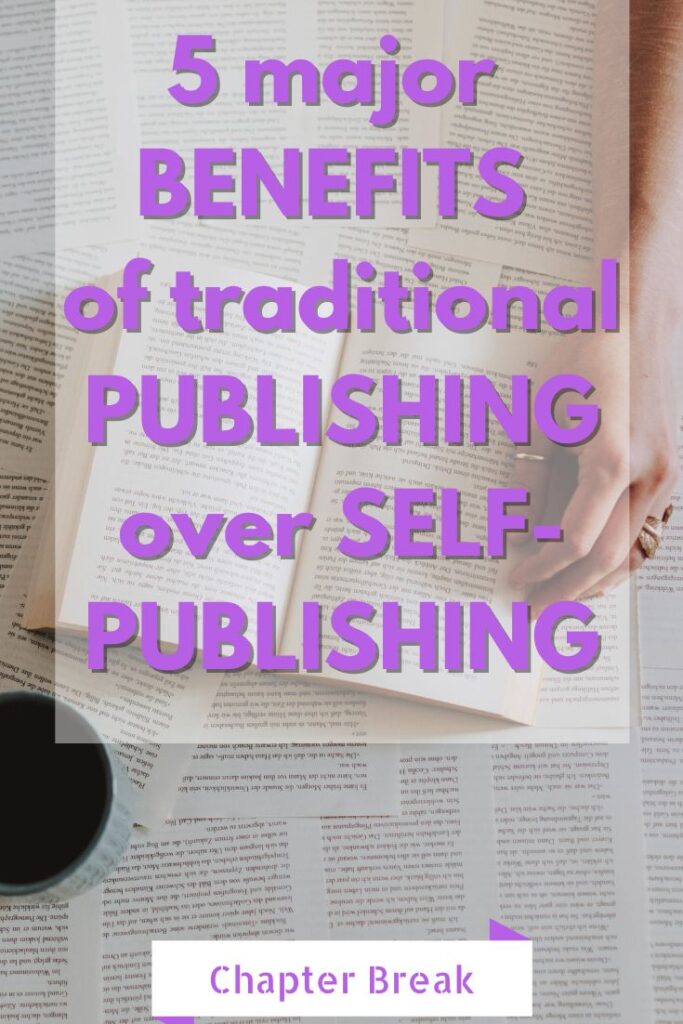With the increasing popularity of self-publishing, many authors choose to forego traditional publishers and run the gamut themselves. Self-publishing gives them ownership of the whole process — from draft to print — and more control over their royalties and earnings.
However, traditional publishing is still the beating heart of today’s book market, and choosing to go down the traditional route offers several benefits that self-publishing might not. In this article, we’ll take a closer look at what those benefits are to help you decide whether traditional publishing is for you.

Benefits of Traditional Publishing
1. A team of professionals
Many authors forget that a lot goes into publishing a book, beyond simply writing an enticing story. Whether you’re writing literary fiction or business nonfiction, you need to go through a thorough editing process, get a professional cover design, and have a solid marketing plan if you want your book to be well-positioned for success.
Managing all of these moving pieces on your own can be challenging and overwhelming. Most authors just want to tell a good story and leave the administrative and financial decisions to someone else. Traditional publishing allows you to do that, as you’ll get a team of experienced professionals who can help you get your book ready for publication in the most efficient way. While they may not be able to offer the type of customized treatment that you’d get if you were to self-publish (since they work on several projects simultaneously), you’ll be putting your book in the safe and very capable hands of an Avengers team of industry experts.
2. No upfront costs
Self-publishing authors can of course also assemble a team of experienced, freelancing professionals to help them with their publishing dreams, but this often comes at a relatively high upfront cost. In return, authors will get a bigger part of the earnings once they start selling copies, though there’s no guarantee that they’ll earn their money back.
With traditional publishing, the publishing house bears the initial cost by investing in a few select books they believe in. You may not earn as big a part of the winnings once you start selling, since that’s when publishers will come to collect, but you won’t have to bear the risks of publishing yourself. What’s more, you may even receive an early advance for your title and a decent royalty deal, depending on your contract (and your literary agent).
Another thing to consider is that your book may actually sell better simply for having been published by a traditional publisher. Let’s look at some reasons for why that is.
3. Reputation by association
Like it or not, traditional publishing often comes with a certain amount of status. There are many reasons for this, some of which are purely based on snobbery, and some of which are based on more legitimate grounds.
For instance, a traditional publishing house acts as a guarantor that the titles they put out meet a certain objective standard in terms of formatting and storytelling. This guarantee does not exist when it comes to self-publishing, where anyone who has the pesos to pay can make their publishing dreams come true. Readers have to wade through vanity projects and poorly written books in order to find a few gems, which means self-published work has a lower overall credibility.
Traditionally published books, on the other hand, will have been deemed interesting and well-crafted enough to be chosen among thousands of other submitted manuscripts by a professional who is used to assessing literary quality. This type of curation process sends a powerful signal to readers and the rest of the bookish market, and lends important credibility to the work.
It’s also worth mentioning that most major literary prizes will only consider traditionally published books, excluding self-published titles from the prestige and visibility of being associated with the award.
4. Exclusive resources
On top of benefitting from the experience and knowledge of in-house publishing employees and the status of being associated with a publishing house, you’ll also have access to an exclusive range of resources and industry connections that can help put your book in the most beneficial position ahead of launch.
From contracting in-demand cover designers or knowing how to find a ghostwriter if needed, to getting you early reviews from big industry names and other types of publicity, publishing houses are like a spider in a web who knows which strings to pull to get the job done. This type of insider information is hard (though not impossible) to come by if you’re self-publishing, and can make a world of difference for your book’s success.
5. Well-established distribution networks
Similarly, traditional publishers are privy to a well-developed distribution network that helps you get your book through the right doors.
If you want to make an audiobook to accompany your print and ebook copies, for example, a traditional publisher can get you into a studio with a professional narrator — perhaps even a celebrity — and will make sure it’s available on mainstream audiobook apps. Likewise, libraries are more likely to stock your title on their physical and virtual shelves if you’re traditionally published, extending your reach and increasing your visibility.
Where traditional publishers truly excel, however, is getting your book into highstreet storefront windows and display cases, or simply widely stocked in brick and mortar stores. The sales people at publishing houses will have quarterly meetings with most major retailers, and could negotiate a good deal for your title, whereas self-published authors may struggle to “work the system” or earn recommendations on their own.
There you have it: some of the major benefits of traditional publishing over bringing your book to the public on your own. Depending on your personal preferences and literary ambitions, I hope this article can help you make an informed decision about which route to choose.
Rose Atkinson-Carter is a writer with Reedsy, advising authors on all things publishing, from answering questions like “what is literary fiction?” to reviewing different writing software and demystifying the publishing process.



